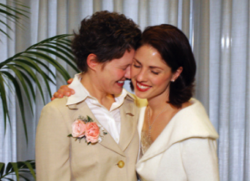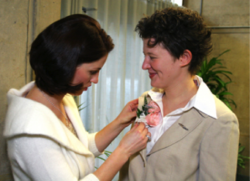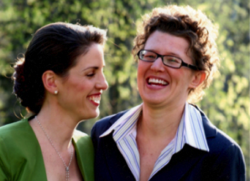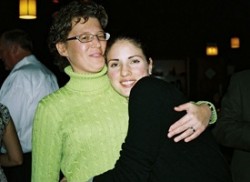


They had planned a family together. A baby. Maybe two.
They’d spend hours talking about their future, often getting so lost in conversation at night they’d forget about the time until the sun was about to rise the next morning.
Sarah “Ellyn” Farley used to say she was “courting” Jennifer Tobits—not just dating her, as she knew their connection would lead them down the aisle.
A year into their relationship, Ellyn asked Jennifer to be her wife. The two soon traveled from their home in Chicago to Toronto for what Jennifer calls a “methodically planned wedding that was about our love and starting our life together.”
Jennifer never could have imagined then that only six years later, she’d find herself where she is now—a widow at 37, in mourning, and fighting her in-laws, who have challenged their marriage and sought control of Ellyn’s estate, as well as the death benefits provided by her employer.
“How could I fathom something like this?” asked Jennifer, who lost Ellyn in September 2010 after a four-year battle with an aggressive form of cancer that the two fought together through the very last days of Ellyn’s life.
Jennifer, who is represented by the National Center for Lesbian Rights, Jerner & Palmer, P.C., Lewis, Feinberg, Lee, Renaker & Jackson, P.C., Prather Ebner LLP, and Kirkland & Ellis LLP, is now defending her right to be recognized as Ellyn’s wife in two cases in separate states.
“No one should ever have to experience the pain of watching the person they love more than anything die, and then immediately face hostility from their loved one’s parents, who don’t want to acknowledge that their child was gay and married,” said Jennifer, who works for a Chicago art restoration and preservation gallery.
She and Ellyn had several mutual friends, and for years, those friends suggested that they meet. But it wasn’t until an unplanned meeting at a 2004 summer street fair in Chicago that the two set eyes on one another.
Their connection was instant, beginning the courtship that brought out the romantic in both of them. Sundays were their days to spend together, and the two would often make their way to the Foster Beach along Lake Michigan for picnics.
A year to the date after they met, Ellyn planned an elaborate marriage proposal. Jennifer didn’t know that Ellyn was going to ask for her hand in marriage. All she knew was that she was spending a day with the woman with whom she wanted to spend the rest of her life.
That day, Ellyn took her to five different places around Chicago, each of which had played a significant role in their courtship. At each location, Ellyn presented Jennifer with a card that told her when she knew she loved her, and how much she meant to her, and that she knew she was the one.
Ellyn handed Jennifer the fifth card along their favorite Lake Michigan beach where the two normally picnicked. It was already dark out when Jennifer began to read the final letter, and Ellyn asked: “Will you marry me?”
Jennifer said yes. They decided to get married in Canada, largely because Ellyn, an attorney, wanted their marriage to be legal, and not tied up in the court system, as marriages of same-sex couples had been in the United States in several regions.
Their wedding in Toronto was small, but they celebrated their nuptials with an elaborate reception in Chicago. Sadly, Ellyn’s mother directed her not to tell the rest of her family. After their wedding, Ellyn visited her doctor after experiencing some blurred vision. The diagnosis: A rare form of eye cancer known as ocular melanoma.
Ellyn and Jennifer fought the cancer side-by side, spending countless hours researching and studying, trying to do everything possible to find a cure for the disease, and praying the cancer wouldn’t spread.
But by late 2007, the cancer had metastasized, spreading to Ellyn’s liver—a prognosis that no one before her had ever been known to survive. In early September 2010, Ellyn’s liver began to fail. Finally acknowledging that she would soon die, Ellyn began fearing her parents would make things hard for Jennifer after she was gone.
In an attempt to pacify her parents, and to protect Jennifer from them, Ellyn made her parents the beneficiaries of her life insurance policy, worth nearly half a million dollars.
But it turns out Ellyn was correct that her parents would make things difficult anyway. When Ellyn was hospitalized during her final days, Jennifer contacted Ellyn’s parents. From the moment Ellyn’s parents showed up at the hospital, their intimidation was relentless.
While Ellyn lay in her hospital bed, weak and close to death, her father repeatedly asked to see her will. He insisted that he and Ellyn’s mother take the bed in Ellyn’s room and told Jennifer she could have a chair “for the time being.”
Ellyn’s parents also attempted to usurp Jennifer’s role as Ellyn’s chosen medical decision maker. And hours before she died, they pressured Ellyn to name them the beneficiaries of the profit-sharing plan at her law firm.
Jennifer gets choked up when she thinks about the last five years. But she looks to memories—and the time that she and Ellyn shared—for strength.
She remembers the street fair. Their connection. Their late night talks. Sunday beach days. The marriage proposal.
Sometimes, she flips through a scrapbook that chronicles their life together, and the many cards Ellyn gave her. A handwritten card from Ellyn always stands out. Ellyn wrote it on February 17, 2010—their fourth wedding anniversary, and seven months before her death.
It says:
“Thank you for marrying me and for staying married to me! I love you dearly. All my love, Ellyn”.
Read a personal story written by Ellyn Farley about her relationship and love for Jennifer.

